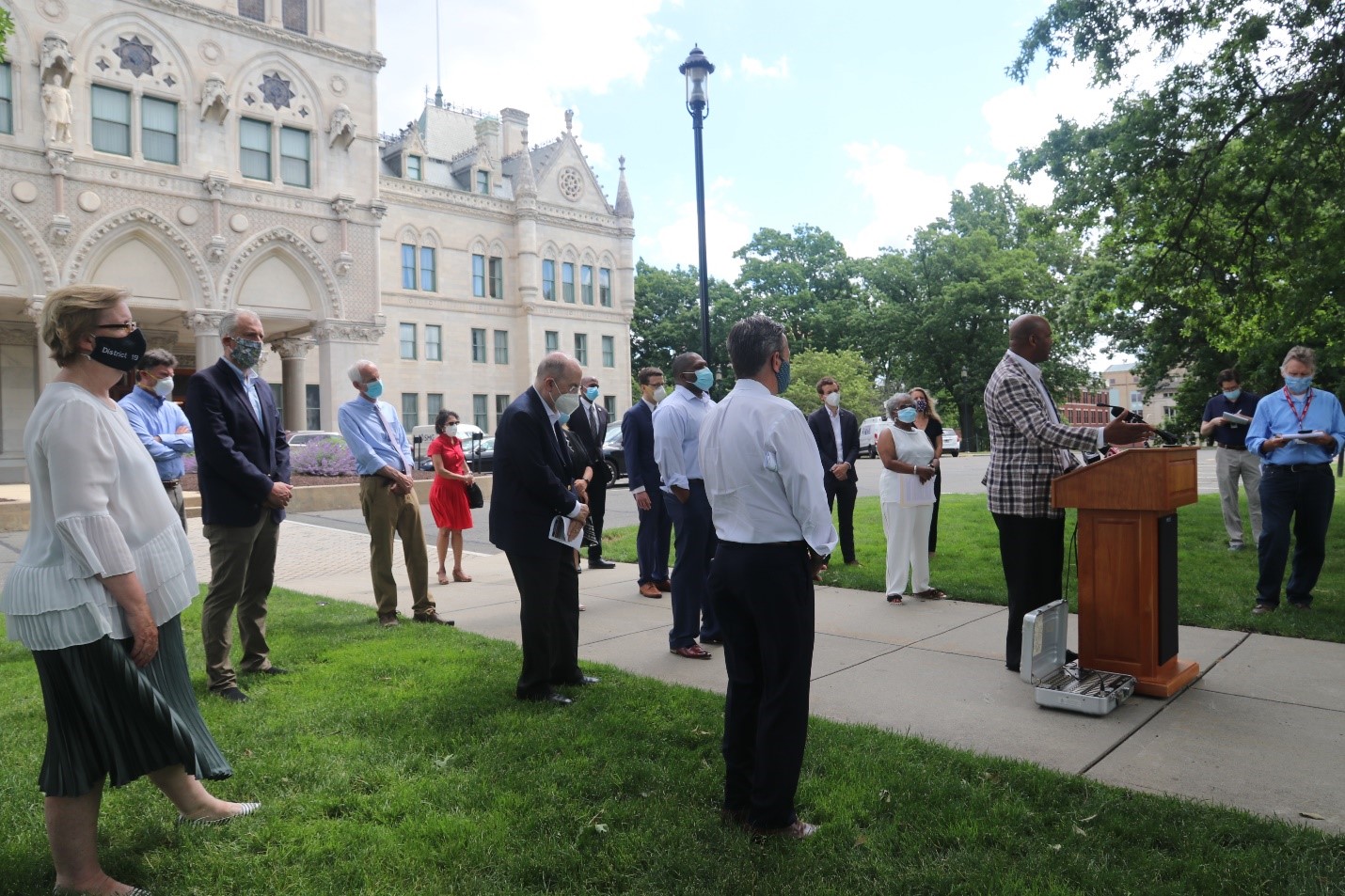Senator Osten, Senate Democrats Announce Juneteenth Agenda for Special Session
Hearing the Calls from Demonstrations, Senate Democrats Unveil Wide-Ranging Policy Proposals to Address Police Accountability and Systemic Racial Inequities

HARTFORD – Today, state Senator Cathy Osten (D-Sprague) and the Connecticut Senate Democratic Caucus announced a series of wide-ranging policy proposals to address police accountability and systemic racial inequities during the 2020 special session.
Senate Democrats chose Juneteenth, the day commemorating the abolishment of slavery, to announce this agenda. In addition, the Senate Democrats had a Black Lives Matter flag flown above the State Capitol for the first time ever in order to recognize the movement and the important holiday.
“It’s vital that we publicize the policies that we believe will directly address the issues of racial injustice that we see in Connecticut and across America – including the injustices that have historically been imposed on Native Americans,” said Sen. Osten, who joined her colleagues in front of the State Capitol to unveil their agenda.
“Our message to the people of Connecticut is simple: we hear you and we will take action,” said Senate President Pro Tempore Martin M. Looney (D-New Haven). “There are moments in our history that pass us by and there are moments that turn into movements. We will not let the voices on our town greens and our streets be ignored and we will ensure this movement transforms the laws and policies of Connecticut.”
Senate Democrats aim to reform criminal justice and police accountability policies, provide more economic opportunities, address educational inequality, reform health care, and address housing, the environment, and voting rights.
The legislative proposals outlined today are listed below. More details on the proposals can be found here.
Criminal Justice & Police Accountability
Banning Chokeholds & Other Unnecessary Police Actions
To combat police brutality and end dangerous and unnecessary police actions
Prosecutorial Reform
To empower an Inspector General to investigate cases of police misconduct and use of force
Decertifying Police Officers
To decertify police convicted of misconduct
Banning “No Knock” Warrants
To prevent police from executing “no knock” warrants and entering a property without notification
Duty to Intervene
To require police to intervene if another is engaging in brutality or misconduct
Requiring Body Cameras
To ensure all Connecticut police are equipped with body cameras
“Walking While Black” & Custodial Arrest Reform
To reform arrest policies in order to curb unnecessary detentions and custodial arrests
Increasing the Power of Civilian Review Boards
To provide more power to Civilian Review Boards when reviewing an investigation
Amy Cooper Law
To charge persons who call 9-1-1 making false accusations against someone based on race, gender, or religion
Better Police Training
To provide better and more frequent anti-bias training for police
Economic Opportunity
Renaissance Districts
To create “renaissance” investments in affordable housing, retail, and social services programs that are focused on the education, health, and economic development for of the residents of in that neighborhood
Supporting Minority-Owned Businesses
To provide additional support for minority-owned businesses
Expanding Workforce Development
To get more students involved in job-training programs
Educational Inequality
Minority Teacher Support and Recruitment
To address the racial diversity of our teaching staff
Expanding Access to High-Opportunity School Districts
To break down the historic inequities in our public education system where a child’s zip code too often determines the quality of their education
Addressing Entrenched Educational Disparities in Connecticut
To address the educational disparities highlighted and exacerbated by the COVID-19 pandemic
Native American History in School Curriculums
To ensure the history of Native Americans is taught in our public schools
Health Care Reform
Addressing Overall Health Equity Issues
To address major health disparities by race and ethnicity which result in poorer health, premature deaths and hundreds of millions of dollars in health care costs
Strengthening COVID-19 Testing and Contact Tracing
To improve Connecticut’s approach to key COVID-19 prevention tools and to ensure a more equitable response
Addressing Disproportionate Cases and Deaths of Minority Populations from COVID-19
To address entrenched health disparities and strengthen state resources in the event of future public health emergencies
Strengthening Telehealth
To expand telehealth services used during the COVID-19 pandemic
Capping Insulin Costs
To cap exorbitant insulin costs and provide patients access to emergency insulin supplies
Supporting Community Health Workers
To fund community health workers who are an essential liaison between the health care and social services systems
Health Care Data Collection and Reporting
To expand data collection and reporting by race, gender, and other guidelines in order to expose health disparities and better guide health policies
Nursing Home Safeguards
To increase protections and strengthen procedures for nursing homes
Curbing Junk Health Insurance
To regulate the practices of so-called “junk” health insurance policies which deliberately target minority communities and people who have lost their jobs
Protecting Workers
To ensure everyone injured on job, especially those impacted by COVID-19, get increased protections, including workers’ compensation
Tackling Insurance Premiums
To examine and regulate expected insurance rate increases during a time of economic distress and record insurance company profits
Housing, the Environment, Voting Rights, and Recognition
Increasing Affordable Housing Opportunities
To increase access to and the availability of affordable housing, especially in areas with disproportionately low amounts of affordable housing
Addressing Unequal Zoning Restrictions
To address the major impact that local zoning laws contribute to housing discrimination
Addressing Environmental Injustice
To tackle the racial inequities exacerbated by pollution and emissions, which disproportionately impact minorities
Expanding Access to Absentee Ballots
To provide increased access to absentee ballots for voters and election workers concerned about their health and safety during the coronavirus pandemic
Juneteenth as a State Holiday
To establish Juneteenth, June 19, as a state holiday
Share this page:
